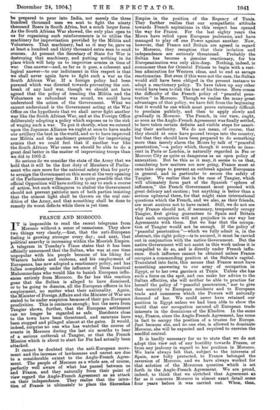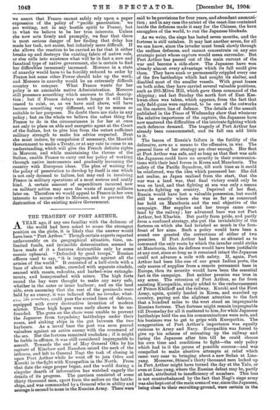I T is impossible to read the recent telegrams from Morocco
without a sense of uneasiness. They show two things very clearly,—first, that the anti-European feeling is growing stronger every day ; and next, that political anarchy is increasing within the Moorish Empire. A telegram in Tuesday's Times states that it has been officially announced that the Sultan, who was at one time unpopular with his people because of his liking for Western habits and customs, and his employment of Europeans, has now adopted a reactionary policy, and has fallen completely under the influence of those fanatical Mahommedans who would like to banish European influ- ences entirely from Morocco. So far has this reaction gone that the Sultan is alleged to have dismissed, or to be going to dismiss, all the European officers in his employment, no matter what their nationality. Again, the Minister of Foreign Affairs and the Minister of War are stated to be under suspicion because of their pro-European proclivities. This is ominous enough ; but the news from Tangier shows, further, that the European settlement can no longer be regarded as safe. Residents close to the town have been threatened, and caravans have been stopped and pillaged almost at the gates. It would, indeed, surprise no one who has watched the course of events in Morocco during the last six months to hear of a serious outbreak at Tangier, or that the French Mission which is about to start for Fez had actually been It cannot be doubted that the anti-European move- ment and the increase of lawlessness and unrest are due to a considerable extent to the Anglo-French Agree- ment. The people of Morocco as a whole are, of course, perfectly well aware of what has passed between us and France, and they naturally from their point of view regard the Anglo-French Agreement as an attack on their independence. They realise that the inten- tion of France is ultimately to place the Shereefian Empire in the position of the Regency of Tunis. They further realise that our sympathetic attitude towards French aspirations in this respect has opened the way for France. For the last eighty years the Moors have relied upon European jealousies, and have managed to play off one Power against another. Now, however, that France and Britain are agreed in regard to Morocco, they recognise that their isolation and independence are seriously threatened. Probably the Sultan has become a genuine reactionary, for his Europeanisation was only skin-deep. Nothing, indeed, is commoner than for Oriental Princes to begin with a rest- less admiration for Western ideas, and to end as savage reactionaries. But even if this were not the case, the Sultan would still have been obliged in the present instance to adopt a reactionary policy. To have taken up any other would have been to risk the loss of his throne. Here comes the difficulty of the French policy of " peaceful pene- tration " in Morocco. Though we realise the many great advantages of that policy, we have felt from the beginning that it would be one which must prove extremely difficult to proclaim publicly, and then to apply slowly and gradually in Morocco. The French, in our view, ought, as soon as the Anglo-French Agreement was finally settled, to have taken certain definite and visible steps for assert- ing their authority. We do not mean, of course, that they should at once have poured troops into the country, but that they should have been prepared to do something more than merely alarm the Moors by talk of " peaceful penetration,"—a policy which, though it sounds so inno- cent in Paris or London, is naturally regarded in Fez or Morocco City as quite as dangerous as an open policy of annexation. But be this as it may, it seems to us that, considering how matters are now going, France must at once take steps to prevent an outbreak against Europeans in general, and in particular to secure the safety of Tangier. We realise that in the case of Tangier, which will ultimately form part of the Spanish " sphere of influence," the French Government must proceed with great delicacy and caution ; but anything is better than a serious upheaval there, for that might raise international questions which the French, and we also, as their friends, are most anxious not to have raised. Still, we do not see why France should not, if necessary, temporarily occupy Tangier, first giving guarantees to Spain and Britain that such occupation will not prejudice in any way her Agreements with them. But we fear that the occupa- tion of Tangier would not be enough. If the policy of "peaceful penetration "—which we fully admit is, in the abstract, the right policy—is to succeed, it must be carried out in conjunction with the native Government. But the native Government will not assist in this work unless it is compelled to do so, and is directly under French influ- ence. Such influence cannot be obtained unless France occupies a commanding position at the Sultan's capital. Translated into facts, this means that France must have something answering to our army of occupation in Egypt, or to her own garrison at Tunis. Unless she has such a force on the spot, and can make her advice to the Sultan effective, she will neither be able to practise for herself the policy of " peaceful penetration," nor to give that security to European residents and to European trade and commerce which the Powers will naturally demand of her. We could never have retained our position in Egypt unless we had been able to show the world that our occupation secured all European trade interests in the dominions of the Khedive. In the same way, France, since the Anglo-French Agreement, has come in fact to occupy the position of a trustee for Europe. Just because she, and no one else, is allowed to dominate Morocco, she will be expected and required to exercise the needful control.
It is hardly necessary for us to state that we do not adopt this view out of any hostility towards France, or from any jealousy in regard to her position in Morocco. We have always felt that, subject to the interests of Spain, now fully protected, to France belonged the reversion of Morocco, and we have always worked for that solution of the Moroccan question which is set forth in the Anglo-French Agreement. We are proud, indeed, to think that we sketched that Agreement as far as it concerns Morocco in almost exact detail some four years before it was carried out. When, then, we assert that France cannot safely rely upon a paper expression of the policy of "pacific penetration," we are writing, not in any hostile spirit to France, but in what we believe to be her true interests. Unless she now acts firmly and promptly, we fear that there is most serious danger of her finding that delay has made her task, not easier, but infinitely more difficult. If she allows the reaction to be carried so far that it either breaks up and destroys the existing fabric of native rule, or else calls into existence what will be in fact a new and fanatical type of native government, she is certain to find her difficulties immensely increased. Morocco in a state of anarchy would have to be forcibly reduced to order by France lest some other Power should take up the work, and Morocco in anarchy would be an extremely difficult country to conquer. What France wants for her policy is an amenable native Administration. Morocco still possesses something which answers to that descrip- tion ; but if France delays much longer it will have ceased to exist, or, as we have said above, will have become something very different, and by no means so suitable to her purposes. No doubt there are risks in any policy ; but on the whole we believe the safest thing for France to do in the circumstances is for her at once not only to place an able and energetic agent at the Court of the Sultan, but to give him from the outset sufficient military strength to make his advice respected. Next she must induce, by compulsion if necessary, the Moorish Government to make a Treaty, or at any rate to come to an understanding, which will give the French definite rights in Morocco, and while maintaining the throne of the Sultan, enable France to carry out her policy of working through native instruments and gradually leavening the country with European ideas. The plan of waiting for the policy of penetration to develop by itself is one which is not only doomed to failure, but may end in involving France in military operations of a most serious and costly kind. A certain amount of expenditure incurred now on military action may save the waste of many millions later on. Therefore we would appeal to France in her own interests to secure order in Morocco, and to prevent the destruction of the existing native Government.
THE TRAGEDY OF PORT ARTHUR,



































 Previous page
Previous page